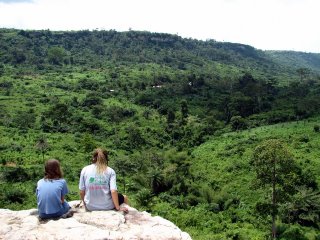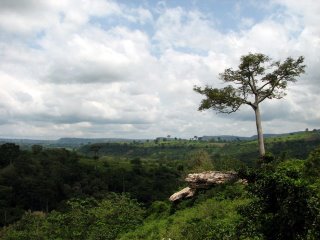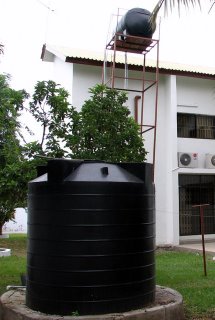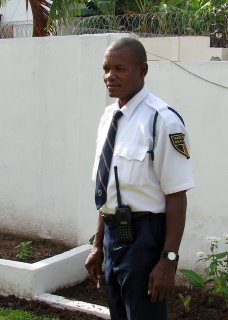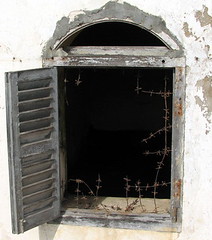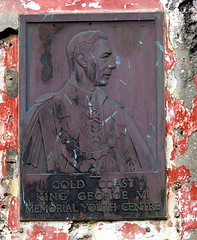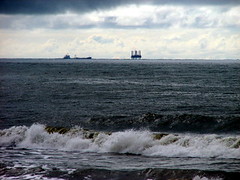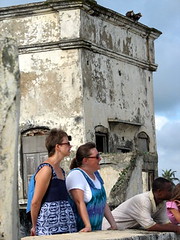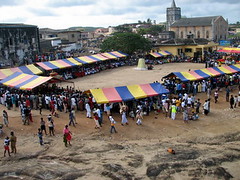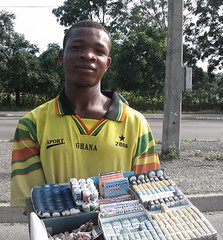Tour Ghana 2006 (by Fox)

Hey everyone it’s Fox. As my mom probably mentioned to you I just got back from a tour around Ghana. I got into some trouble though and so now she’s forcing me to write about it for the blog. So I guess if I’m gonna write about this I better start from the beginning.
It was Thursday and I was at school when my friend Alastair came up to me with the idea. He’s English in heritage and has partway between an English accent and an American one. He’s about 6’ 2” and he’s a senior at the school I go to, Lincoln. So he comes up to me with a big smile and says, “Hey Fox you wanna come on a tour of Ghana with me?”, “Sure” I say. “But I’m not sure if I can go, my parents already have something that they wanna do instead. Something about camping on a beach I think.” ,“Oh” He says. “Don’t worry though I’ll talk to them and see what I can do, alright?” “Alright man, you better come though, I’ll talk to you later, I got a class I’m late to.” “Cool alright talk to you then. Later.”
So I go home to my parents later on and ask them about it. Contrary to what I thought, they are actually for it, somewhat. “That sounds like a lot of fun,” my dad says. “I sure wish I could go.” My moms more realistic though. “Sure, sounds like fun but what about the trip your dad and sisters are taking?” I was prepared for this, however. Sort of. “Well, I guess I’m gonna have to skip it.” I say. Not much for preparation, but it will have to do.
“Hmmm… Well we’ll have to talk about it.” Oooh that doesn’t sound good. Well, they talked about it and they started being more and more open to the idea, mostly thanks to, in my opinion, my dad vouching for me. But still, they needed more info and stuff, so I told them about the meeting at what I have dubbed “The Mormon Compound”.
Oh yah I forgot to tell you. All the people that went on the trip besides me, (Kyle Gay, Alastair McKee, Kip Krieger) are all Mormons. L Lol. The Mormon compound is more like a big apartment complex filled to the brim with Mormons. Its got a swimming pool, two gates and guards, which isn’t unusual, except they took the time to convert the guards into Mormons.
So we all went to the Mormon compound to talk out the final details and such and luckily we had everything that the parents needed. All our parents said yes and asked how much money we needed.
You probably didn’t know this, but Jay-Z came to Ghana. All my friends went to go see them, but the tickets cost 1 million Cedes (about 100 dollars) and I didn’t want to spend all that money. But finally, after I realized that I was one of about 10 people that weren’t going, I tried to get a ticket. Unfortunately, by the time my parents were at the store to get it, they had just run out. So because none of us had gone to the concert, (they were all of the 10. They’re Mormons, after all) we decided that we would see if we could spend less in a week of traveling what others spent in one night. Our parents decided to give us all more than a mil but only enough to be able to get home if we absolutely had to or if we were robbed.
We set out the day after that meeting. I slept over in the Mormon compound and we were out of the compound and into a taxi by 7:30. We went to the STC station and waited around for an hour or so, passing the time by making fun of hippies.
Hippies are what Lincolners (people that go to my school, Lincoln International School) call people who come to Ghana by choice, be it to teach orphans or heal the sick or smoke Ghanaian drugs. Lol. They are usually white, wearing Ghanaian print clothing and showing off waist-length hair. These hippies were no exception. We got the hippies to take a picture of us and we got on the bus.
Well, I wouldn’t really describe it as what you would think of as a bus because it was more of a cross between airliner seats and a tour bus. It was kind of a boring ride down to Cape Coast, I sat next to Kyle and we swapped girl stories for a couple of hours and slept. It wasn’t comfortable sleeping but it was the best we could get.
After we got there we tried to get a taxi to the canopy walk. We finally talked the guy down to a reasonable price and we got going. However, not 30 minutes into the ride, the taxi broke down. The guy was so proud, he wouldn’t even let us push it up the hill (which we really wanted to do) so after it broke down all the way and wouldn’t move another inch, the driver called another taxi over, talked to him frantically in Twi, one of the native languages in Ghana, and we were on our way again.
Eventually, after being squished in the back of a taxi for forever we got to the walk. The canopy walk is a thing in the middle of a rainforest where you can walk 100 feet above the ground on these rope bridges. It was so much fun and we took a ton of pictures. We took our taxi to a place called London Bridge which we saw was hardly a bridge, it was just concrete over a sewer line. They probably spent more concrete making the sign that said London Bridge than on the actual bridge.
We then tried to find our hostel but it took a while. People kept asking about us and tried to sell us pot like they had never seen white people around there, so everyone took on a different name except me. I just used Wesley. My favorite memory of it was when we were near the castle and our waitress asked about us and where we were staying etc. Kip told her his name was Isaac, that we had lived in Ghana for 4 years and that we were all seniors. When she asked about our lodging, Kip said that we were going to try a bit of a role-reversal and we would sleep in the cells of the slave castle and they could stand outside and watch us. I don’t think she realized that it was a joke, she just looked at us funny and left quickly to go get our food. Lol.
On the way back to our hostel, we saw some little African boys playing soccer (about 30 to 40) and Al decided that he really wanted to play. So Al and Kyle played soccer and I played goalie (keeper) and amazed the little kids while Kip got bothered by the other kids and watched our stuff. We went to our hostel, dropped off our stuff and went to the hotel across the street to eat and watch a soccer (football) game.
On the way back from the restaurant, Kip and I were walking back to the hostel to get some Mentos for a Coke-and-Mentos experiment, when a lady came out of the darkness and said to us, “Tsssst. Abruni (White Man) Give me all your stuff.” To which Kip replied, “No! It’s mine.” and left.
After we spent the night on some scary looking mattresses with bloodstains, vomit, etc. we got up early to catch a taxi to Takaradi. We were going to take a tro-tro but it turns out it was almost as cheap to take a taxi. So we took a taxi to Takaradi and the driver had a tape from the Titanic soundtrack that he played about 5 times that skipped at the same parts every time. It was semi-annoying.
In Takaradi, we went to a restaurant that Kip swore had the best pizzas in Ghana called Captain Hooks. It had good pizza, but the service was slow and the pizzas were so small! It was also really expensive.
We left there, went to the Areeba place next door to see if we could score some free stickers. Didn’t work. L.
After that we just went outside, called a taxi over and asked how much a ride to Boushoua would cost. Argued for a while about a dollar and then agreed on it. During the ride, the highlights were that we saw our driver bribe a police officer, and we saw this white guy covered in tattoos that looked like a mercenary. Other than that, it was relatively uneventful.
When we got there we found a place that was relatively inexpensive and close to the really, really expensive hotel. It looked semi-run down and had community showers and toilets, unlike the hostel, but there were bars on the windows and it looked pretty safe. We asked the guy at the front how much for one room and he refused to give it to us! We were trying to order the suite which was about 15 USD a night but the guy refused to sell it to us because there were 2 beds for one person each and we were going to share beds. Instead, he wanted us to get two single rooms that were about 6 USD each that each had one bed made for one person. Go figure.
So we got the rooms for cheaper, set our stuff down got on our bathing suits and went to the really expensive hotel. We were dressed in such a way that Ghanaians didn’t think we were rich, and nice enough that the hotel people thought we were guests there. It worked out perfectly and we swam in the ocean for a couple of hours.
After that we went back to the hotel to get some food and watch a football (soccer) game, only to find that the hotel didn’t have the channel. So we went back to the really expensive place and watched it in their lobby. Kip and I were bored by the whole thing so we played pool.
Barcelona beat Chelsea 2-0.
After the game we decided to walk around and we saw that the W.H.O. was having a little party so Al and Kip danced with them for a while and Kyle and I laughed.
It was getting dark and Al decided that he wanted to take a walk along the beach so we grabbed a flashlight and walked. We also didn’t have reception and I heard about this magic reception place so we walked. At some point, we turned on the flashlight and saw that the beach around us was covered in crabs! We took Kip’s Flip-flops and started sliding them at them to try to hit one. We finally got one and broke it’s leg, so Kyle put it out of its misery with his knife.
We finally got to the stairs and went up them. It was about midnight and really dark so no one wanted to be last and we were almost racing up them. When we got up at the top, lo and behold, we had reception! We all sent txts to girls we liked and some called their parents to check in. After Kip and I were done, we went to go sit on the stairs while Kyle tried to get a hold of his girl.
Finally after about 10 minutes Kyle and Al come back to the stairs with grim looks on their faces. “You guys finally done?” I ask. They don’t respond and almost start running down the stairs. Kip and I look at each other and follow.
At the bottom they tell us. “Dude there were people up there!” “What?” “Yah, Kyle and I heard something that sounded like an animal for a while, when we finally realized it was two people speaking Twi.” (The stairs and the land belonged to someone besides the resort. It was about a mile away)
We started heading back to the resort at a rather quick pace, not even stopping to kill crabs. After we got there we went back to the hotel and slept, mainly because we couldn’t think of anything else to do. The next morning we argued about whether we should go up to Kumasi, and I finally won. They finally agreed, as a favor to me, and because we didn’t have anything else to do there, to go.
We got to the STC station, waited around for two hours and passed the time listening to the new Dane Cook album, Vicious Circle inside an Indian restaurant. When it finally came, we got on and got seats really close to the back. We talked with some of the Ghanaians, and they agreed to switch seats with us so we could all sit in the back row.
We left Takaradi in comfort. There was air conditioning, empty seats, and plenty of foot room. Then, for some reason, we pulled into another STC station about an hour later out of our 4 hour bus ride. When we got there, among other people that got on the bus, there were two white women and a Ghanaian man. He took what was my seat, and the girls couldn’t find a seat. Finally the driver told them just to squeeze into the back row with us (To which Kip curtly and loudly replied, “Don’t worry guys, the white people sit at the back of the bus. It’s the revenge of Rosa Parks.”) That made 6 people for 5 seats and those 6 people were the only white people on the bus.
We chatted with the girls for a while and found out about them. They were 21 and 26 and they were hippies (see above) from Ireland and Scotland. They were in Ghana to teach orphans English and math. They were pretty cool and we talked to them for a while.
We got to Kumasi, finally, and went straight to ‘the Presby’ which was a Presbyterian hostel that was pretty nice. Community showers and toilets but a nice room. So we dropped all our stuff off and went over to get something to eat.
We heard about this place in the Ghana Guide called Chopsticks which we heard had amazing Chinese food. Instead, however, we got pizzas. The pizzas were half the price that they were at Captain Hooks and a little bigger. They tasted amazing!
While we were eating, a girl came up to us and asked if we had any cigarettes. We all said no, but we invited her to sit and eat with us. She said ok and invited her friend over. They had both just come from America and had arrived in Ghana less than a week ago. She asked us if there were any good bars or clubs to go to in Kumasi. Of course, we didn’t know, but we had seen a bar on our way to go and eat and we invited to walk them to it. They said sure and we called our friend Leona, who we were going to hang out with later and asked if she would come to the bar and pick us up. She said ok but it was going to be a couple of hours, so we went with the girls and hung out playing pool for a while. We played some other people that were there and didn’t do too bad.
Eventually Leo came to pick us up and we said goodbye to the girls and went over to her house. When we got there, we hung out with Leo and some of her friends that had stayed but had their flight cancelled. They were really tired and kind of boring cause they didn’t say much. We were going to go check out a haunted house that was right next to Leona’s house, but Leo’s house keeper wouldn’t let us go because she was afraid that we would get mugged or raped or something.
We went back to the house and Al and Kip found these big bucket things and a lid so they made up a game that involved using the lid as a Frisbee and having to knock over the buckets. I played a round or two and then we decided to play hide and seek. We tried and Al hid on the roof from Kip and Kyle hid in the buckets. I wanted to talk to Leo so I walked around with her and her friends because they didn’t want to hide, so they just ran around the house from Kip.
I didn’t really get to talk to Leo, but we left anyway after a round or two of hide and seek. Leo’s dad drove us back to the Presby and when we got there I decided that I wanted to burn something so I gathered up some sticks and lit them with Kyle’s emergency stuff. As soon as Kip saw the fire, his Eagle scout instincts kicked in and he decided he wanted to make it as big as possible.
Soon, we got the attention of the guard, who came over to talk to us. He asked us what we were doing and I replied that we were burning sticks. He said ok and started talking to us.
We learned about him and he suggested that we go to the zoo the next day. He asked us if we had zoos in Accra and America. We said yes. He asked us if there were dinosaurs in them. We looked at each other and Al said that he wasn’t sure. The guard said that he really wanted to see dinosaurs before 2010. We asked what he meant. He told us that Jesus was going to come back in 2010 to resurrect the dinosaurs to destroy Ghana and that we should repent of our sins before the dinosaurs destroyed us and our homes. We looked at each other and laughed thinking he was joking, but then we looked at him and he looked decidedly serious. We said we would watch out for them.
Al talked to him for a while and Kip finally decided that it was time to put out the fire. As soon as it was out, we said goodbye and went off too our rooms. I stayed in Al and Kip’s room for a while, and then I decided to call Leona. I talked to her for a while and she said that if we wanted to go to the zoo she would come. After a while Miriam, Leo’s friend, called and I said that I should probably go.
I went back inside to the room and Kip and Al were jumping on the bed. I told them I was going back to my room, they called me a lightweight for not wanting to stay up late and I left. As soon as I got there I was tired and in a bad mood so I crashed on the bed and slept.
Al, Kip and Kyle stayed up all night, for some reason, and woke me up at 6:15 the next day. I got up and we went to the market.
In the market, we walked around and I got two shirts for 3000 cedes (about 30 cents) each. We all got shirts except for Kyle. I bought a machete and Kip and I started walking back to the room to put it in a bag while Kyle and Al bought a black light.
On our way back, a Ghanaian guy came up to Kip and I and started trying to be our friend so we would buy stuff from him. Kip took the tactic of acting like we didn’t speak English. The guy was so persistent! He followed us for blocks while we were talking gibberish to each other trying to make him go away, and he finally set up shop right outside the Presby.
We went inside and shortly after Al and Kyle showed up and we told him about the guy. Eventually we packed up, checked out and left via taxi.
We got to the STC station and waited around for an hour for our bus to come, and when it finally came, we found out that it didn’t have air conditioning. It had broken. So they called everyone with a ticket up to the front and gave us a 10,000 cede discount (about a dollar) out of our 75000 cede ride. I bought a cake with my refund and we all climbed on to the bus.
Al and I sat near the middle very close to the most annoying Ghanaian I have ever come across. This lady was elderly, about 65 or 70 and had a radio with a tape player. She played the same old, worn gospel tape the entire trip and sang along to it at the top of her lungs. She had it turned up loud and at breaks did muttering and such of “praise Jesus” and “Amen God”. She played that tape for the entirety of the 6 hours. It was so annoying! I wanted just to have my ipod and some speakers to treat her to some of my music.
About two hours through the hot, sticky bus ride our bus broke down. It had overheated. Al and I got off the bus, soon to be followed by Kyle. Kip slept through the whole thing and later told us that he thought he dreamed it. Al, of course, had to play soccer with the little kids and so he went and showed off for a while. After the driver had poured several buckets of water on the engine, it was up and running again so we all got on.
It was pretty uneventful for the rest of the ride home which was about 6 hours except that we were stuck in traffic the rest of the time.
After we got back, we all got into a taxi after a big semi blew a tire right in front of us while it was u-turning and almost flattened us.
We got back to our houses and went to sleep. The next day Kip and Al went to a walk for breast cancer at about 7 a.m. and I got there at 7:30. Kyle didn’t want to come.
We did the walk, held the sign, sang some songs and got a hat and shirt. It was pretty fun and it officially marked the end of Tour Ghana 2006. Overall, it was a fun trip and I got to know Kyle, Kip, and Al, and we have loads of stories! Lol alright, well that’s my story, now that I’m done I can go to the dance. I might write for the blog again, but I’m not sure so peace out. Lol
-Fox

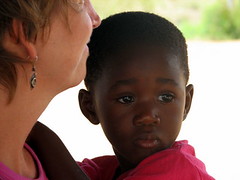
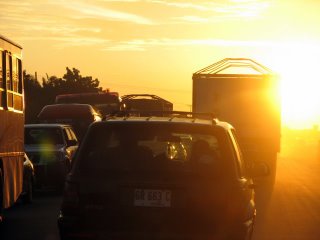
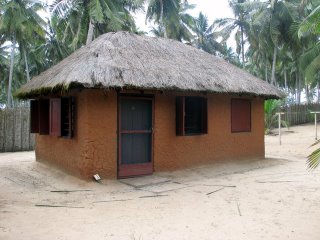
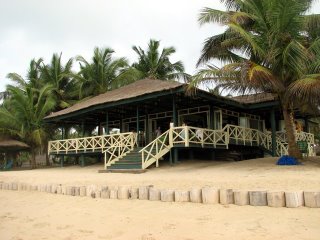 The restaurant was a large hut overlooking the ocean, with good food (albeit you had to be patient) and a lovely atmosphere. The kids probably ate 20 “cheese toasties” (little grilled cheese sandwiches made in one of those little machines) over the course of the weekend. Everything I had was good. Assorted other games were played by various combinations of folks throughout the weekend – Bocci Ball (which is it’s Italian name, I’m told – the game we played, I forget the name, went by it’s French name, but was the same game), Pit (a card game we’ve come to enjoy here), and others. We passed around our Time magazines that my Mom sends every week, which were a huge hit.
The restaurant was a large hut overlooking the ocean, with good food (albeit you had to be patient) and a lovely atmosphere. The kids probably ate 20 “cheese toasties” (little grilled cheese sandwiches made in one of those little machines) over the course of the weekend. Everything I had was good. Assorted other games were played by various combinations of folks throughout the weekend – Bocci Ball (which is it’s Italian name, I’m told – the game we played, I forget the name, went by it’s French name, but was the same game), Pit (a card game we’ve come to enjoy here), and others. We passed around our Time magazines that my Mom sends every week, which were a huge hit.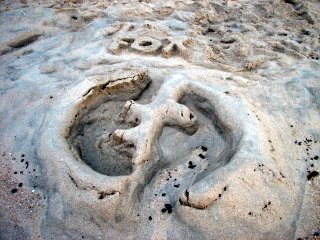
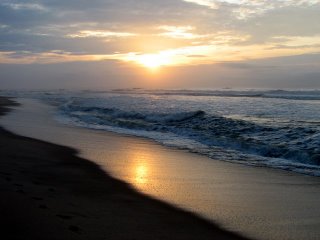
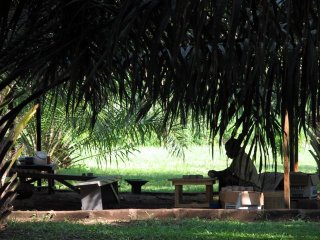
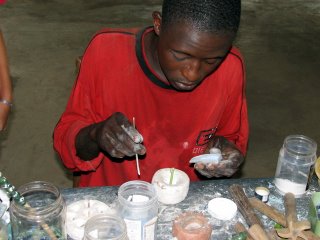
 Most beads they hand paint afterward, although the clay ones they add different tints in patterns to the molds and the patterns are fired in. Even the painted ones are re-fired after painting to permanently set the designs.
Most beads they hand paint afterward, although the clay ones they add different tints in patterns to the molds and the patterns are fired in. Even the painted ones are re-fired after painting to permanently set the designs. 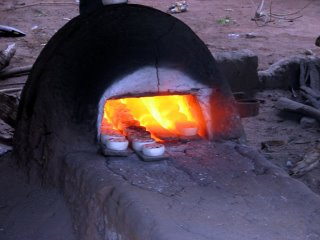 It was interesting to watch this centuries old process to see how these were made, and amazing that each bead was handmade in this manner. We spent quite some time in the gift shop (thinking ahead toward Christmas) and then hit the road again.
It was interesting to watch this centuries old process to see how these were made, and amazing that each bead was handmade in this manner. We spent quite some time in the gift shop (thinking ahead toward Christmas) and then hit the road again. 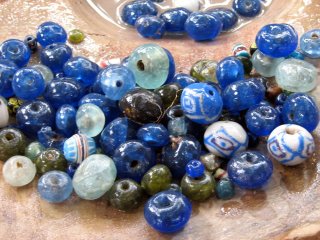 We continued north, but decided to leave the dam at Lake Volta for another trip – we turned we st and went to a large town called Koforidua, where we found a hotel and ate and went to bed.
We continued north, but decided to leave the dam at Lake Volta for another trip – we turned we st and went to a large town called Koforidua, where we found a hotel and ate and went to bed.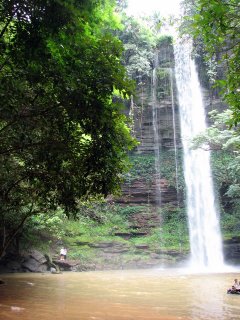
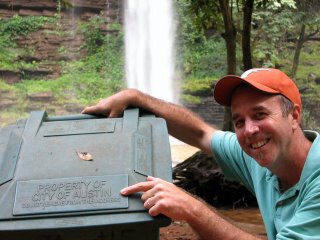
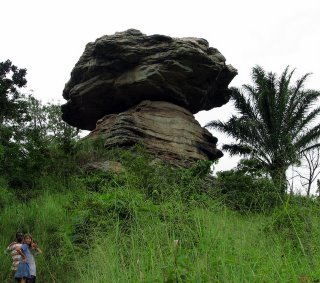 Just as well for them, since they weren’t stuck waiting for the 40-somethings that way. The hike through the rain forest was amazing – up, DOWN, up, to the cave, then down, and UP to the umbrella stone. The umbrella stone is a natural mushroom-shaped rock formation up on a hill, with a nice breeze (which we needed after the hike!) and a beautiful view! Underneath the rock were a dozen or more villagers, who hang there with oranges, bananas, water, groundnuts, etc., that they brought there to sell to the tired obrunis who trek there to see the stone – they said 50 or so a day come there. We saw 4 other obrunis, besides the Swedes and German, in the hour or so we were there. We each got an orange, which are often served here peeled down to the white rind (for sanitation purposes) with the white rind cut at one end, forming a “bowl” of orange juice, as fresh as you can get! You squeeze and suck (impossible to do this at all daintily) until no amount of squeezing or sucking yields any more juice. And, all for about 5 cents each.
Just as well for them, since they weren’t stuck waiting for the 40-somethings that way. The hike through the rain forest was amazing – up, DOWN, up, to the cave, then down, and UP to the umbrella stone. The umbrella stone is a natural mushroom-shaped rock formation up on a hill, with a nice breeze (which we needed after the hike!) and a beautiful view! Underneath the rock were a dozen or more villagers, who hang there with oranges, bananas, water, groundnuts, etc., that they brought there to sell to the tired obrunis who trek there to see the stone – they said 50 or so a day come there. We saw 4 other obrunis, besides the Swedes and German, in the hour or so we were there. We each got an orange, which are often served here peeled down to the white rind (for sanitation purposes) with the white rind cut at one end, forming a “bowl” of orange juice, as fresh as you can get! You squeeze and suck (impossible to do this at all daintily) until no amount of squeezing or sucking yields any more juice. And, all for about 5 cents each.  The villagers had also fashioned a ladder of bamboo, that for 1000 cedis each (about 10 cents) you could use it to climb to the top of the umbrella stone. Steve and the girls did this – I was content to stay on the gr ound with our guide, who told me that they are told not to climb to the top because it is dangerous. Grace heard him say this, and immediately exclaimed, “Oh, I want to do that!”
The villagers had also fashioned a ladder of bamboo, that for 1000 cedis each (about 10 cents) you could use it to climb to the top of the umbrella stone. Steve and the girls did this – I was content to stay on the gr ound with our guide, who told me that they are told not to climb to the top because it is dangerous. Grace heard him say this, and immediately exclaimed, “Oh, I want to do that!”